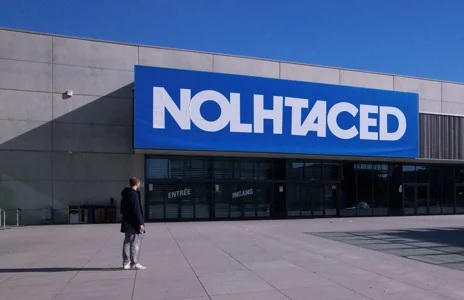Nolhtaced, the upcycling by Decathlon

Upcycling in fashion, or the trend that consists on giving a second life to clothes, is a subject now taken up by a growing number of brands to counter the effects of fast-fashion. Decathlon presents today its vision which, faithful to the habits of the group, wants to be marketed and innovating.
FACTS
-
With its new temporary brand Nolhtaced (simply Decathlon in reverse), the French sports equipment giant is offering an innovative concept to its Belgian customers, based on the reverse shopping model.
-
The brand has just opened a Nolhtaced concept store in Belgium, based on the codes of a shop entirely dedicated to the recovery and resale of sports equipment items.
-
Nolhtaced undertakes to organise the collection and purchase of old products from its customers, including products that were not originally purchased from Décathlon. The group repairs them and then resells them to new customers, second-hand, but under guarantee.
-
The sales customers are paid in Décathlon vouchers valid for at least two years on the range of new equipment, on second-hand items or on the rental offer available within the sports chain.
-
During the test phase of the Nolhtaced offer, Décathlon says it bought some 26,000 sports items (for a total value of 593,220 euros in vouchers) and recovered 15,000 products that were used as exhibition models or for tests. Nearly 80% of them have already been sold.
CHALLENGES
-
A responsible approach: The concept of Nolhtaced is simple: to organise the reuse of as much sports equipment as possible to reduce the impact on the environment and avoid waste. A new role for Decathlon.
-
A more advanced commitment to the circular economy: This is not the first time that Decathlon Belgium has deployed offers and initiatives related to the circular economy market. The group launched its We Play Circular project in 2021, a subscription offer consisting on proposing to Decathlon customers to rent equipment from all departments. The group finally announced the deployment of this successful initiative last May.
-
Participating in the improvement of purchasing power: In the current context of inflation, Decathlon presents its initiative as a way to participate to the stability of its customers' purchasing power since the company is now a buyer of their unused equipment. It also opens up potential access to a wider base of sports equipment to less well-off customers since second-hand products are offered for resale at a lower cost.
MARKET PERSPECTIVE
-
Many brands, both prêt-à-porter (such as H&M) and retail platforms, are now entering the burgeoning upcycling market. The latest example is online, with the initiative of the private sales site Veepee, which organises the recycling of unsold goods via its Upcycling Solution offer.
-
For Décathlon Belgium, the market seems vast. In addition to the success of its test, the brand is relying on the results of a recent survey among more than a thousand Belgians. 30% of them said they had postponed buying new sportswear and equipment because of the rising cost of living. 20% say they have turned to second-hand equipment and 15% opt for second-hand clothing to meet their needs today.
